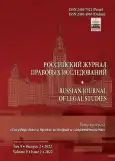Legal Translation: Professional Activities at the Periphery of the Juridical Field
- Authors: Maslovskaya E.V.1
-
Affiliations:
- Sociological Institute of the Federal Center of Theoretical and Applied Sociology of the Russian Academy of Sciences
- Issue: Vol 9, No 2 (2022)
- Pages: 65-74
- Section: Criminal law and process
- URL: https://journal-vniispk.ru/2410-7522/article/view/105185
- DOI: https://doi.org/10.17816/RJLS105185
- ID: 105185
Cite item
Abstract
The relevance of this topic is defined by the growing involvement of legal interpreters in legal proceedings. This article aims to study the peculiarities of the professional activities of interpreters in criminal legal proceedings involving migrants from post-Soviet states. The main characteristics of the field of legal translation are analyzed, and the peculiarities of the recruitment of legal interpreters and their interaction with the procedural parties in courts of different jurisdictions are revealed. The theoretical framework of the study is composed of Pierre Bourdieu’s sociological theory, including his analysis of the juridical field, and contemporary approaches in the anthropology of professions. The main empirical methods include semi-structured interviews and nonparticipant observation. The study singles out the criteria of stratification of legal interpreters, and demonstrates how the institutional and sociocultural contexts influence the professional activities of interpreters. The forms of interaction of interpreters with procedural parties and the judge were analyzed, demonstrating the costs of communication between the interpreters and different actors of the juridical field. According to the results, legal interpreters follow informal rules that have been formed in the process of their everyday interaction with their main clients — law enforcement bodies. Structural and epistemic disagreements between jurists and interpreters were revealed. The research data also demonstrate that interpreters are not full-fledged actors of the juridical field, but they fulfill a technical function within that field. A conclusion is made about the weak structuring of the field of legal translation and predominance of precarious employment of actors of this field. The revealed problems could be solved by the institutionalization of the expert position of court interpreters.
Full Text
##article.viewOnOriginalSite##About the authors
Elena V. Maslovskaya
Sociological Institute of the Federal Center of Theoretical and Applied Sociology of the Russian Academy of Sciences
Author for correspondence.
Email: ev.maslovskaia@socinst.ru
ORCID iD: 0000-0001-9759-5298
SPIN-code: 8550-6742
doctor of sciences (sociology), lead researcher
Russian Federation, 25/14, 7-th Krasnoarmeiskaya st., Saint-Petersburg, 190005References
- Noordegraaf M. From “pure” to “hybrid” professionalism: present-day professionalism in ambiguous public domains. Administration & Society. 2007;39(6):761–785. doi: 10.1177/0095399707304434
- Kubal A. Spiral effect of the law: migrants’ experiences of the state law in Russia – a comparative perspective. International Journal of Law in Context. 2016;12(4):453–468. doi: 10.1017/S1744552316000215
- Kubal A. In search of justice: migrants’ experiences of appeal in the Moscow city court. In: Kurkchiyan M, Kubal A, editors. A sociology of justice in Russia. Cambridge: Cambridge University Press, 2018. P. 92–117.
- Reeves M. Living form the nerves: deportability, indeterminacy and the “feel of law” in migrant Moscow. Social Analysis. 2015;59(4):119–136. doi: 10.3167/sa.2015.590408
- Maslovskaya EV. Court interpreters in the investigation of criminal cases involving migrants: types of professional behavior and social practices. Sotsiologicheskie Issledovaniya. 2021;(2):39–48. doi: 10.31857/S013216250012811-5 (In Russ.).
- Shmatko NA. Social space of Pierre Bourdieu. In: Bourdieu P. Social space: fields and practices. Saint-Petersburg: Aleteya, 2005. P. 554–576. (In Russ.).
- Bourdieu P. Social space: fields and practices. Saint-Petersburg: Aleteya, 2005. 576 p. (In Russ.).
- Anleu S. Law and social change. London: SAGE, 2009.
- Maslovskaya E.V. Formation and current trends of development of sociology of law in the USA and Great Britain. Sotsiologicheskie Issledovaniya. 2015;(4):87–95. (In Russ.).
- Sommerlad H. Researching and theorizing the processes of professional identity formation. Journal of Law and Society. 2007;34(2):190–217. doi: 10.1111/j.1467-6478.2007.00388.x
- Francis A. At the edge of law: emergent and divergent models of legal professionalism. London: Routledge, 2011.
- Aliverti A, Seoighe R. Lost in translation? Examining the role of court interpreters in cases involving foreign national defendants in England and Wales. New Criminal Law Review. 2017;20(1):130–156. doi: 10.1525/nclr.2017.20.1.130
- Lee J. Conflicting views on court interpreting examined through surveys of legal professionals and court interpreters. Interpreting. 2009;11(1):35–56. doi: 10.1075/intp.11.1.04lee
- Morris R. Images of the court interpreter: professional identity, role definition and self-image. Translation and Interpreting Studies. 2010;5(1):20–40. doi: 10.1075/tis.5.1.02mor
- Norström E, Fioretos I, Gustafsson K. Working conditions of community interpreters in Sweden: opportunities and shortcomings. Interpreting. 2012;14(2):242–260. doi: 10.1075/intp.14.2.06nor
- Resta Z, Ioannidis A. A sociological approach to the professionalization of court interpreting in Greece. In: Bajčić M, Dobrić Basaneže K, editors. Towards professionalization of legal translators and court interpreters in the EU. Cambridge: Cambridge Scholars Publishing, 2016. P. 66–82.
- Inghilleri M. Habitus, field and discourse: interpreting as a socially situated activity. Target. 2003;15(2):243–268. doi: 10.1075/target.15.2.03ing
- Yarskaya-Smirnova E, Romanov P, editors. Professii.doc. Social transformations of professionalism: views from outside and from inside. Moscow: TsSPGI, 2007. 408 p. (In Russ.).
Supplementary files







